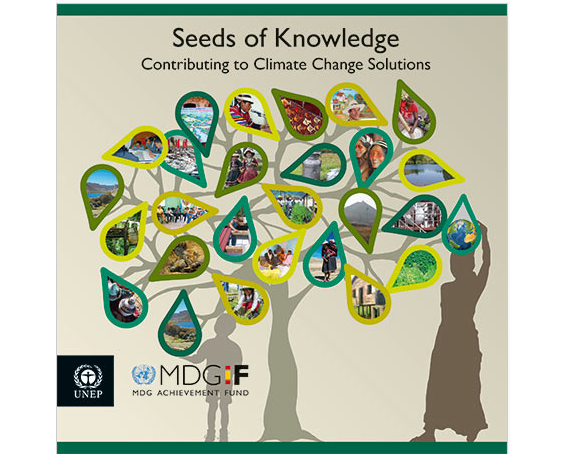

Grassroots solutions to climate change

As 194 nations hammer out a climate change agreement in Doha, the Millennium Development Goals Achievement Fund (MDG-F) is showing how grassroots, community-led responses are already helping countries build resilience to climate change’s impacts.
Seeds of Knowledge, a new booklet launched in Doha by the United Nations Environment Programme (UNEP), shows how MDG-F-funded projects in 17 countries around the world are guiding the policies needed to adapt to climate change, reversing the loss of natural resources and contributing to an inclusive Green Economy.
“A key contribution to the legacy of the MDG Achievement Fund is the knowledge base that has been generated,” said UNEP Executive Director Achim Steiner. “We now have a resource to draw on across the UN system and also at the level of the member states to take the lessons learned and use them in the implementation of future programmes.”
Heaviest Toll on the Poor
The impacts of climate change are likely to be felt most strongly in the world’s poorest regions, which have the least economic, institutional and technical ability to adapt and cope. The MDG-Fund, which was created to accelerate progress towards the Millennium Development Goals, focuses particularly on the most disadvantaged populations and communities.
Seeds of Knowledge shows that with the right levels of investment and support, initiatives like those supported by the MDG-Fund and implemented by UNEP can be scaled up and become a key part of reducing climate risks and supporting the transition to an inclusive green economy.
It features case studies from Afghanistan, Bosnia & Herzegovina, Columbia, China, Ecuador, Egypt, Ethiopia, Guatemala, Jordan, Mauritania, Mozambique, Nicaragua, Panama, Peru, Philippines, Senegal and Turkey.
Building Resilience
Rural indigenous communities in Peru’s southern Andean highlands have been hit hard by climate change. Endemic poverty means that these remote communities cannot afford a bad harvest. But in recent years, sudden changes in weather have impacted traditional crops and water supplies.
Located in isolated mountainous regions, the communities rely largely on the radio for information. With this in mind, the MDG-F funded a radio broadcast popularly known as ‘Pachamamanchista Munakusun’ (Nurturing Our Land) to build awareness about climate change and adaptation measures.
The show airs daily in Quechua, the local language, and Spanish, identifying local problems and proposing ways for adapting to climate change. The broadcasts also teach adaptation measures such as water harvesting, reforestation with native species, protection of biodiversity and prevention of forest fires and overgrazing.
Other case studies featured in the booklet include efforts to ensure clean water provision in Jordan, amidst rising challenges from climate change. Increasing temperatures and changing precipitation patterns in the country have put limited water supplies under even greater pressure. This has led to more frequent use of wastewater, which has a negative impact on human health.
The UN Joint Programme under the MDG-F has been working with Jordan’s Ministry of Health and experts to ensure that climate change becomes an integral part of the country’s overall health plan.
The urban poor of Sorsogon, in the southernmost province of Luzon in the Philippines, live along the esteros, which are the rivers and coastal areas highly vulnerable to natural hazards such as typhoons, flooding and storm surges. The Joint Programme there worked with the local government and communities to design climate-resilient social infrastructures for vulnerable populations.
Towards environmental sustainability
The MDG-F is supporting 17 joint programmes in the area of environment and climate change with an allocation of US$89.5 million. These efforts contribute to achieving MDG-7 on environmental sustainability, particularly the target of integrating the principles of sustainable development into country policies and programmes and reversing the loss of environmental resources.
By emphasizing climate change’s impact on the poor, the MDG-F ensures that its initiatives remain inextricably linked to issues of poverty and inequality.
Click here to read the full report.
Click here to see a video about the MDG-F's climate change and environment work.